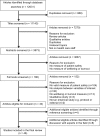Healthcare Staff Wellbeing, Burnout, and Patient Safety: A Systematic Review
- PMID: 27391946
- PMCID: PMC4938539
- DOI: 10.1371/journal.pone.0159015
Healthcare Staff Wellbeing, Burnout, and Patient Safety: A Systematic Review
Abstract
Objective: To determine whether there is an association between healthcare professionals' wellbeing and burnout, with patient safety.
Design: Systematic research review.
Data sources: PsychInfo (1806 to July 2015), Medline (1946 to July 2015), Embase (1947 to July 2015) and Scopus (1823 to July 2015) were searched, along with reference lists of eligible articles.
Eligibility criteria for selecting studies: Quantitative, empirical studies that included i) either a measure of wellbeing or burnout, and ii) patient safety, in healthcare staff populations.
Results: Forty-six studies were identified. Sixteen out of the 27 studies that measured wellbeing found a significant correlation between poor wellbeing and worse patient safety, with six additional studies finding an association with some but not all scales used, and one study finding a significant association but in the opposite direction to the majority of studies. Twenty-one out of the 30 studies that measured burnout found a significant association between burnout and patient safety, whilst a further four studies found an association between one or more (but not all) subscales of the burnout measures employed, and patient safety.
Conclusions: Poor wellbeing and moderate to high levels of burnout are associated, in the majority of studies reviewed, with poor patient safety outcomes such as medical errors, however the lack of prospective studies reduces the ability to determine causality. Further prospective studies, research in primary care, conducted within the UK, and a clearer definition of healthcare staff wellbeing are needed.
Implications: This review illustrates the need for healthcare organisations to consider improving employees' mental health as well as creating safer work environments when planning interventions to improve patient safety.
Systematic review registration: PROSPERO registration number: CRD42015023340.
Conflict of interest statement
Figures
References
-
- Health Do. An Organisation with a Memory: Report of an Expert Group on Learning from Adverse Events in the NHS Chaired by the Chief Medical Officer: The Stationery Office London; 2000.
-
- Avery T, Barber N, Ghaleb M, Franklin BD, Armstrong S, Crowe S, et al. Investigating the prevalence and causes of prescribing errors in general practice London: The General Medical Council: PRACtICe Study. 2012.
-
- West CP, Huschka MM, Novotny PJ, Sloan JA, Kolars JC, Habermann TM, et al. Association of perceived medical errors with resident distress and empathy: A prospective longitudinal study. Journal of the American Medical Association. 2006;296(9):1071–8. . - PubMed
-
- Saleh AM, Awadalla NJ, El-masri YM, Sleem WF. Impacts of nurses' circadian rhythm sleep disorders, fatigue, and depression on medication administration errors. Egyptian Journal of Chest Diseases and Tuberculosis. 2014;63(1):145–53. .
Publication types
MeSH terms
LinkOut - more resources
Full Text Sources
Other Literature Sources
Medical



